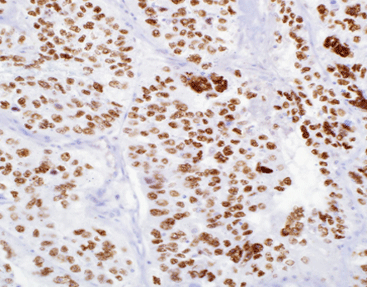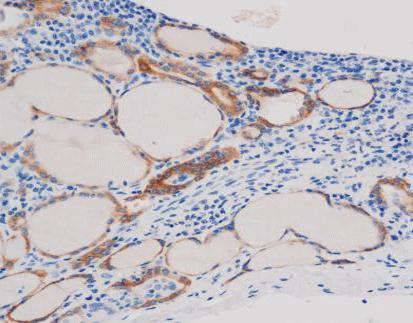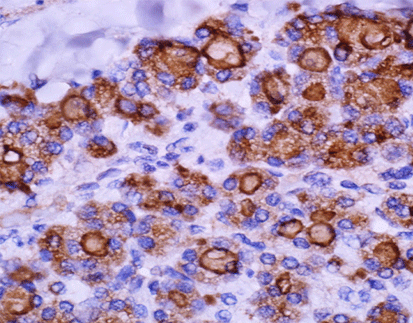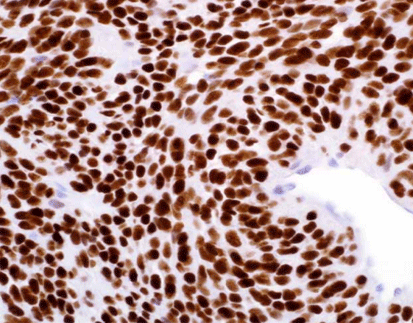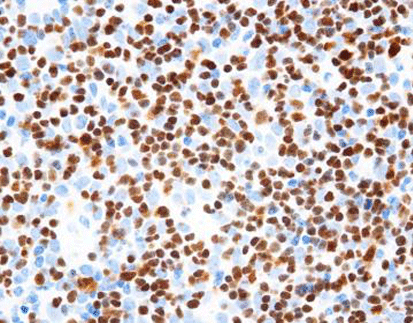 PRODUCT CATEGORY
PRODUCT CATEGORY
CONTACT US
Phone
Email
Address
6 Cuizhu St, Zhong Yuan Qu, Zheng Zhou Shi, He Nan Sheng, China, 450001
TFE3(C1A10), MMab
Xp11.2 translocation renal cell carcinoma is a newly discovered subtype in the classification of kidney cancer, which is more likely to occur in children and adolescents than adults. Morphologically, these tumors show papillary structures, clear cytoplasm, and often have psammoma bodies. TFE3 is the most specific marker for Xp11.2 translocation renal cell carcinoma. And the mechanism may be promote the overexpression of TFE3 due to the formation of fusion genes. Alveolar soft part sarcoma (ASPS) is a rare soft tissue sarcoma of uncertain differentiation type, usually occurring in the limbs of young patients. The feature is chromosome rearrangement on 17q25 and Xp11.2 producing ASPSCRI-TFE3 fusion gene and abnormal transcription. This abnormal chimeric transcription factor retains the N-terminus and DNA binding domain encoded by TFE3, and the ASPSCR1 coding part may provide fragments that regulate gene expression. This super-activated transcription factor may induce the expression of a large number of molecules, contributing to the diagnosis, evolution and transfer of ASPS.
Staining Tissue
[As Figure shows]
Renal cell carcinoma tissue stained with TFE3
[Intended Use]
Xp11.2 translocation renal cell carcinoma is a newly discovered subtype in the classification of kidney cancer, which is more likely to occur in children and adolescents than adults. Morphologically, these tumors show papillary structures, clear cytoplasm, and often have psammoma bodies. TFE3 is the most specific marker for Xp11.2 translocation renal cell carcinoma. And the mechanism may be promote the overexpression of TFE3 due to the formation of fusion genes. Alveolar soft part sarcoma (ASPS) is a rare soft tissue sarcoma of uncertain differentiation type, usually occurring in the limbs of young patients. The feature is chromosome rearrangement on 17q25 and Xp11.2 producing ASPSCRI-TFE3 fusion gene and abnormal transcription. This abnormal chimeric transcription factor retains the N-terminus and DNA binding domain encoded by TFE3, and the ASPSCR1 coding part may provide fragments that regulate gene expression. This super-activated transcription factor may induce the expression of a large number of molecules, contributing to the diagnosis, evolution and transfer of ASPS.
[Specifications]
| Product Name | TFE3(C1A10), MMab |
| Catalog No. | CTM-0142 |
| Intended Use | IVD, RUO |
| Species Reactivity | Human; others not tested |
| Cellular Localization | Cytoplasm / Nucleus |
| Antibody Type | Rabbit Monoclonal |
| Clone | C1A10 |
| Format and Volume | Ready-to-use: 1mL, 3mL, 6mL Concentrated: 0.1mL, 0.2mL and 1mL |
[Datasheets & SDS]
| IVD Datasheet (IFU) | ↕️ Download |
| RUO Datasheet (IFU) | ↕️ Download |
| SDS sheet | check with sales |
[Storage and Validity]
Store at 2~8°C. Avoid freezing.
Maintain temperature below room temperature during transport, ensuring it does not exceed one week.



